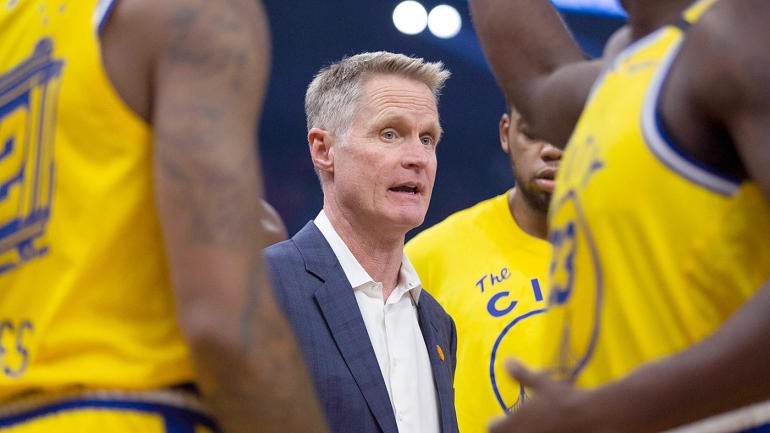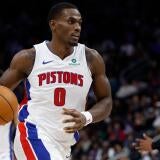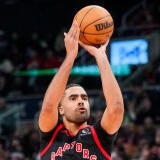2020 NBA Draft Lottery: What winning the No. 1 pick would mean for Warriors, Knicks and all 14 teams involved
The lottery means different things to different teams

Parity is a rarity in the NBA. A handful of superstars make the basketball world go round for 364 days every year, but on lottery night? The future of this multi-billion dollar industry is entrusted to a collection of 14 ping pong balls. Your team's destiny depends on which numbers pop out of a lottery machine, and with the flattened odds introduced last season, practically every team in the field can credibly allow itself to dream that the Draft Gods will smile upon them.
But how would a victory in Thursday night's lottery actually impact each team in the field? Which teams need a win more than others? Let's go team by team and figure out what the No. 1 pick would actually mean for the 14 teams that missed the 2020 postseason.
Golden State Warriors
In the grand scheme of things, the No. 1 pick doesn't mean all that much to Golden State. The Warriors' stated intent of emulating San Antonio's decades of contention notwithstanding, Stephen Curry is 32 years old, Draymond Green is 30, and Klay Thompson is 30 coming off a torn ACL. The time to win is now, and that pick will, in all likelihood, serve as trade bait for veterans who could fit their current core's timeline. The No. 1 pick is always going to have more value than the No. 5 pick, but this isn't Zion Williamson vs. Darius Garland. This is a balanced class. The trade value of their pick is going to be roughly similar no matter where it lands.
If anything, a cheaper pick might help the Warriors a bit if they actually keep it. Golden State will almost certainly be in the luxury tax next season. The Warriors aren't thinking that way, but given the uncertain value of this No. 1 pick and the less-than-robust trade market at the moment, there is a reasonable chance that they wind up keeping the pick, and they don't appear to have a strong preference. They've so far been linked to Deni Avdija, Anthony Edwards and Onyeka Onkungwu. Odds are, one prospect they like lasts until their pick, and given their lack of immediate needs, they won't be desperate for any single prospect.
Cleveland Cavaliers
The No. 1 pick means less to Cleveland than it would for most of the teams in position to win it. This is a guard-heavy lottery. Cleveland has already invested lottery picks in Collin Sexton and Darius Garland. That likely takes Edwards or LaMelo Ball off the table barring a trade. They have so many veteran big men that finding minutes for Okungwu or James Wiseman would be difficult. Cleveland could go off book and take a sorely needed wing ... but the kinds of players the Cavs need will be available later on.
There's an argument that they'd even prefer to. The Cavaliers have been there and done that with the No. 1 pick. That isn't to say they wouldn't welcome it for the right prospect, but after winning three lotteries in four tries after LeBron James left the first time, the pressure on a potential fourth No. 1 pick would be substantial. Optically speaking, if the player isn't likely to change, Cleveland likely wouldn't mind taking him a bit lower.
Minnesota Timberwolves
Golden State and Cleveland, for very different reasons, can afford to be relatively indifferent toward the No. 1 pick. The Timberwolves can't. They absolutely have to get this pick right, whoever it is. Golden State has their first-round pick next season. If they're still in the lottery after that, their relationship with Karl-Anthony Towns will likely have been damaged beyond repair. This is, in all likelihood, Minnesota's last chance to add another significant difference-maker. The higher the pick, the better the chance that they do so.
Like Cleveland, Minnesota needs wings, but with Brooklyn's No. 16 overall pick in tow, it can afford to swing for talent with its first choice. Guards like Ball and Edwards don't make much sense with D'Angelo Russell in place, but one of the bigs could make a difference defensively next to Towns, who struggles on that end of the floor. Okungwu fits the bill in that regard. Wiseman could, though he still has a ways to go on that front. A trade down to replenish the assets lost in the Russell deal would be sensible as well.
Atlanta Hawks
This would be the ultimate luxury pick for the Hawks, and a chance to define their future more tangibly than any of their other picks have so far. Atlanta has its primary ball-handler in Trae Young. It has its 3-and-D wings in Kevin Huerter, DeAndre Hunter and Cam Reddish. It has two core bigs in John Collins and Clint Capela. Assuming everyone grows as expected, there are no glaring holes here (though defense with Young will always be an issue). That would give the Hawks a chance to get wild with the No. 1 pick in ways few other teams could.
Most teams with a long-term point guard would likely avoid Ball, for example. Atlanta's opportunity cost in taking him would be pretty minimal, and the chance to pair him with Young and create a generational passing team would be tempting. Edwards is a local prospect that would excite fans. Grabbing a wing like Avdija, or even someone lower on most boards like Devin Vassell, could allow them to build in Boston's image. There's just no harm in passing on any single player in this class for Atlanta, specifically, because of their current construction. They can draft guilt-free.
Detroit Pistons
The Pistons haven't finished in the top half of the league in attendance since 2010. They haven't won a playoff game since 2008. The No. 1 pick is their ticket to relevance. Ball, for all of his flaws as a prospect, is a draw, and they have struggled to fill their new arena since it opened in 2017.
In basketball terms, it's the culmination of a rebuild that has quietly been brewing for years. Detroit stole Svi Mykhailiuk from the Lakers at the 2019 trade deadline. It found a potential diamond in the rough in Sekou Doumbaya with their 2019 lottery pick, and picked Christian Wood off the scrap heap only to watch him average nearly 20 points in his final 22 games. The Pistons haven't engaged in a full-scale tank, but they have picked up worthwhile young players here and there to the extent that a crown jewel like the No. 1 pick could be enough to push them back toward winning in the near future.
New York Knicks
For the Pistons, the No. 1 pick means relevance. For the Knicks, it means salvation. It doesn't matter how relatively low the value of this No. 1 pick is compared to others, New York just needs a shred of good fortune after two decades of torment. Despite 20 years of near-constant presence in the lottery, the Knicks haven't picked No. 1 overall since 1985. They've never jumped above their lottery slot in the entire history of the current format. The highest pick their misery has ever produced went to the Chicago Bulls in the Eddy Curry trade. LaMarcus Aldridge, Joakim Noah and Gordon Hayward were all taken with picks originally owned by the Knicks. The mere notion that the basketball gods might be smiling on the Knicks again would mean the world to their desperate fan base.
And then there are the ripple effects. The Knicks have been linked to both Chris Paul and DeMar DeRozan. Neither makes a lick of sense given New York's youth, but every move the Knicks have made since hiring Leon Rose suggests that star power is their first and only priority. Landing the No. 1 pick and using it to select Ball, a potential face of the franchise, could save them from themselves. For the time being, it could scratch their star-power itch and allow the young nucleus to grow organically.
Chicago Bulls
Despite its more prudent management, Chicago is in a relatively similar position to New York. Years of bad fortune has turned the fan base cynical, and a No. 1 pick could offer a bit of hope to a franchise that hasn't had much of it since trading Jimmy Butler. The core of Zach LaVine, Coby White, Lauri Markkanen and Wendell Carter is promising, but lacks a surefire star. This draft class does as well, but the first pick is the best chance at landing one.
And based on the traditional age curve and the likely bump that will come merely by not having Jim Boylen as coach, the Bulls are running out of time to find one. LaVine is already 25. Markkanen is eligible for a rookie extension. Eventually, this group is going to be too good to win the lottery but not good enough to win the championship. There is no harder place in the standings to escape in the middle. The Bulls need a home run now to avoid the dreaded treadmill of mediocrity.
Charlotte Hornets
The relevance barometer means perhaps more to Charlotte than it does to Detroit. The Pistons at least have a name that can sell some jerseys in Blake Griffin. The best Hornet right now is ... Devonte' Graham? A second-round pick in his second season that wasn't even a finalist for Most Improved Player. Hornets fans don't have much incentive to tune into games right now. Cody Zeller isn't really a draw.
The basketball side of the equation is a bit more complicated. The Hornets probably shouldn't let their current roster dictate the pick, but their two most important players are undoubtedly guards. Charlotte shouldn't be above running three-guard lineups for a year or two if it means landing Ball or Edwards, but Terry Rozier has never been too keen on sharing the spotlight. Michael Jordan's drafting history leaves quite a bit to be desired as well. A lower pick might present fewer complications, but beggars can't be choosers. The No. 1 pick, even in this draft, would be welcome.
Washington Wizards
While not quite as asset-poor as Minnesota, the Wizards similarly have to contend with a ticking superstar clock. Bradley Beal is two years away from free agency. The Wizards didn't come close to making the playoffs, and while the return of John Wall probably couldn't make them worse, it isn't all that likely to make them significantly better, either. Wall relies heavily on athleticism and is coming off a ruptured Achilles tendon. Anything he provides should be considered a bonus.
But a No. 1 pick? Given two years, that sort of player might be enough to convince Beal that he has a competitive future in Washington, and the bar there doesn't seem all that high. After all, Beal could have joined the loaded free-agent class of 2021, but chose to extend with the Wizards for an extra year last summer. He is clearly open to the idea of remaining with the Wizards if they meet him halfway. Adding a young star could be enough to secure their veteran star for the foreseeable future.
Phoenix Suns
If karma exists, the Suns will win the No. 1 pick. They entered the Disney bubble with almost no chance of reaching the playoffs and came one Caris LeVert miss away from reaching the play-in. The entire basketball world was disappointed to miss out on the 8-0 Suns in the playoffs. A No. 1 pick would be the ultimate consolation prize, and unlike the last time the Suns had one, there isn't a Luka Doncic for them to pass on this time around.
The Ball fit at No. 1 would be relatively clean. He could learn behind Ricky Rubio for a year or two before taking the reins, and Devin Booker's shooting balances out his deficiencies as a scorer. Given Ball's height and length, DeAndre Ayton's athleticism and their strong group of wings, the Suns could switch almost anything defensively. Practically every offensive archetype would exist somewhere on their roster. In basketball terms, there might not be a more fun option than this one.
San Antonio Spurs
The Spurs have missed the playoffs twice in the past 31 years. Both times, they added a No. 1 overall pick the very next season. Technically they drafted David Robinson two years earlier, but naval service kept him away from the NBA until after the lottery season of 1988-89. The Spurs, famously, won the Tim Duncan lottery of 1997 after Robinson missed most of the season due to injury. Chaos has reigned worldwide in 2020. The Spurs winning the lottery as soon as their playoff streak ends would provide a sorely needed dose of order. Gregg Popovich deserves one last young star to mold before he calls it a career.
Finding a fit isn't easy, though. The guards don't make much sense with Derrick White, DeJounte Murray, Lonnie Walker and Keldon Johnson already in place. Jakob Poeltl came off the bench most of the season, but he has played himself onto San Antonio's long-term core, so while the big men might have more upside, the Spurs may want to avoid centers given the small-ball success they had in Orlando. Popovich's drafting record is peerless. This bizarre class could be the perfect challenge for him. If there's a star in this group, the Spurs are the best bet to find him.
New Orleans Pelicans
Just think, we're only a couple of ping pong balls away from uniting the Ball brothers. Of course, given the trade rumors surrounding Lonzo Ball, picking his brother might be more trouble than it's worth. Edwards would make sense as a long-term replacement for Jrue Holiday, though. A shooter next to Lonzo would help offset his weakness there, one that will likely be exacerbated by the need to play a center defensively alongside Zion Williamson for the time being as well.
The real advantage here is the continued optionality it grants the Pelicans. The Anthony Davis blockbuster trade with the Lakers set New Orleans up to rebuild in essentially any manner it saw fit. They had young players, a plethora of cap space and seemingly unlimited draft picks. The No. 1 pick would only add to that war chest. The Pelicans already have arguably the brightest future of any young team in basketball. Why not throw another premium piece onto the pile?
Sacramento Kings
New regimes mean unbridled flexibility. That will especially be true in Sacramento, where Vlade Divac set the bar so low that mere organizational functionality will be viewed as a victory. The Kings are extremely guard-heavy, but Buddy Hield has made his displeasure with the organization clear, and Bogdan Bogdanovic is a restricted free agent. The Kings could find De'Aaron Fox a new back-court partner. They could also take a more traditional big man like Wiseman or Okungwu to pair with the versatile Marvin Bagley.
But like the Knicks and the Bulls, this is an organization in need of a win. Any organizational momentum they'd built during their breakout 2018-19 season died the moment they fired Dave Joerger. The No. 1 pick doesn't fix the past year, or the past decade-and-a-half, but it's a nudge in the right direction for a team that needs one.
Memphis Grizzlies
The basketball fit between Edwards and Ja Morant is obvious. The Grizzlies desperately need another high-level scorer, but one that does more of his work from behind the arc to balance out Morant's drives. There's also a found money element to a potential Grizzlies lottery win. They owe their first-round pick to the Boston Celtics provided it falls below No. 6. They aren't even expecting to have a pick this year. To jump from that to No. 1 would be virtually unprecedented.
Speaking of the Celtics, they have quite a bit to gain from a Memphis win as well. Assuming the Grizzlies remain at 14, a pick that Boston likely assumed would be in the top half of the lottery would wind up at the absolute bottom in a weak draft class. But if the Grizzlies keep their pick this season, Boston gets it next season with no protections. While a No. 1 pick would obviously help an already ascendant Memphis team, rookies tend not to be particularly valuable players right away. Even with that addition and internal growth, there is no guarantee the Grizzlies will develop on a linear path and progress into the playoffs next season. In fact, with the Warriors re-entering the picture and similar growth (and improved health) from plenty of the teams on this list, Memphis' pick will probably be better next year than it is now. The Grizzlies winning the lottery would be a win for them, but Boston getting a higher pick in a better draft would mean just as much for the league at large.


















